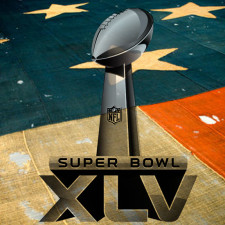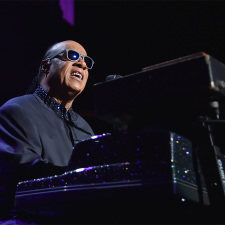Black Music Month Day #13
Now that Dirk and the Boys from Texas have secured their franchise’s first championship last night, it might
be fun to go back to the vault and think about a classic moment in which the NBA and music history intersected provocatively.
Before game three of the 2005 NBA Finals, Stevie Wonder christened the televised festivities with a soulful rendition of the “Star-Spangled Banner.” Performed on his harmonica and accompanied by a string quartet, the spectacle was masterful. It worked on a number of levels, in how it deconstructed this classic song, reconstructed our views about contemporary music in American culture, and instructed about the impact of the notion “musical genius” within such.
As many have observed before me, the modern day NBA has promoted an image strongly indebted to hip-hop musical and visual culture. At all points on the globe, from New York to Milan and beyond, one can witness this arranged marriage on graffiti-sprawled walls, in record bins, on billboards and sportscasts. Along with
this, the orchestrated and heavily marketed bad boy images of players such as Allen Iverson, Ron Artest, and Latrell Sprewell had become, at that time, staples of the NBA’s public corporate face—anti-heroes in the unfolding narrative dramas of a sports season.
Things were going well and business entirely usual until during a fall 2004 Indiana Pacers and Detroit Pistons match, an on-court physical altercation turned very ugly and spilled into the crowd. Following the melee, fines were levied and stiff suspensions meted out. The media saturated quickly with heated discussions about the intersection of race, sports, inflated ticket prices, humongous salaries, and the new entitled “super-fan,” whose electronic credit card transactions empowered them to hurl soda and loud obscenities.
Complicating matters, a few months earlier pop diva Janet Jackson’s infamous “wardrobe malfunction” revealed more than part of her anatomy. The internationally broadcast halftime show of the 2004 Super Bowl caused a global crisis and a scandal of huge proportions (fear of a black tatah, no?). Debates about race, gender, sports, and pop culture swirled in all media outlets. Even the United States Congress weighed in with expected hypercritical political hype, mounting expensive hearings on the media and obscenity at the height of the Iraq war. (It’s funny to think about this last point what with all of the stories that have surfaced since about liaisons in airport bathrooms, twitter accounts gone wild, “side pieces” in Argentina, baby mama drama on the campaign trail, and the latest, Weiner-gate). More fines, damaged record sales, apologies and promises to do better followed.
How did the NBA and NFL clean up their respective acts? They did so with musical genius. Super Bowl 2005 featured Paul McCartney, a middle aged, foreign born, and thoroughly American icon. Middle America found solace in the capable arms and performance rhetoric of one of pop culture’s most adorned musicians. Somewhat past his prime in the mass mediated spotlight, McCartney’s performance was viewed as classic, non-offensive, and to some, a relieving alternative to contemporary pop music choices. An award-winning singer/songwriter, his performance was probably conceived to distance the NFL’s image from the “vulgarities” of present day pop, most obviously
articulated in somestrains of corporate endorsed rap and rock music. Interestingly, what was once viewed as threatening national sensibilities of taste and decorum during the early 1960s would some decades later be chosen as a safe, traditional alternative to illicit language labels, waning moral codes, and faulty stitching in stage costumes.
Indeed, the McCartney example is instructive. The Beatles, a blues-influenced, working class rock quartet from a gritty British town launched McCartney’s fame within a larger cultural movement that was initially received in the United States as threatening the white middle-class status quo. Yet the Beatle’s music is now celebrated as fine works of art, attracting continued journalistic and scholarly reflection—and, thankfully now available on iTunes). Thus, the NFL chose a “universal,” “timeless,” and ironically, a very constructed sense of male musical genius to save the day and our all-American Sunday afternoon football.
Wonder’s performance did similar cultural work for the NBA’s public image. The shrill timbre and virtuoso runs, riffs, and glides of a typical Wonder harmonica performance is, indeed, a wonder. It is as immediately recognized as any musical voice of the twenty-first century some forty or more years after he burst on the scene as a child prodigy. Wonder seems to push the instrument beyond its expressive limits, compressing years of blues, rhythm and blues, gospel, jazz, and pop music into its tiny, hand-sized mass. A formidable companion to his florid, melismatic and energetic vocals, Wonder’s harmonica work embodies a singular voice in global pop. This is voice, and to many listeners, this is genius.
There are many lessons as well as lingering questions here, listed here in no particular order. It’s important to understand how historically situated ideas about musical value are. What at one time is seen as threatening the social order will certainly become a safe, child-friendly resource in time. Why does a corporation like the

Talk to the Hand: Jackson's advertising for her line of lingerie is no malfunction. An art history close reading would note where her fingers are pointing.
NBA cultivate images of edgy, hardened, urban, black culture as its lingua franca and express fake “outrage” when the same shows up at the party sometimes? The performance practices embedded in early Beatles work and in Stevie Wonder’s output generally were seen as counter to America’s “official” culture; but now these same black musical conventions are viewed as wholesome as our most revered elected politicians—wait no this doesn’t work—as anti-gay preachers in mega churches—nope—as Congress’s concern over children’s safe use of the internet—ummm—as a pop diva’s new clothing line. Okay, sometime clichés are easier: as a scoop of vanilla ice cream on apple pie.
Americans need to admit that our society is generally obsessed with violence and sex but don’t like to be. That level of hypocrisy can’t be cured by even a fistful of blues licks and rim shots. Until this underlying contradiction is squared, I’m afraid we’ll continue to pay for Congressional hearings on fake moral issues run by “freaks of the week,” (fund a school anyone?), violence against the most vulnerable in society, and, tweeted wieners in our inboxes.
Try to see things my way; Life is very short, but we can work it out! Enjoy classic Stevie singing one of those good Beatles songs.
Tags: Janet Jackson, Justin Timberlake, NBA, NFL, Paul McCartney, Star Spangled Banner, Stevie Wonder, The Beatles, wardrobe malfunction





 Share On Facebook
Share On Facebook Tweet It
Tweet It






